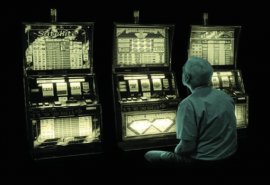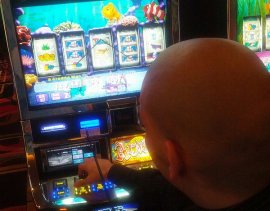Bandit Machine
 According to CBS news, Americans now spend more money on slot machines than movies, baseball, and theme parks combined.
According to CBS news, Americans now spend more money on slot machines than movies, baseball, and theme parks combined.
Americans have always had an uneasy relationship with gambling. To circumvent anti-gambling laws in the US, early slot machines masqueraded as vending machines. They gave out chewing gum as prizes, and those prizes could be redeemed for cash.
Despite outward appearances, slot machines have evolved dramatically since they first appeared in 1895.
To play the first slot machines, you slipped in a coin and pulled the lever to set the machine’s wheels in motion. The slot machine’s crank-action operation (and the way it took your money) earned it the nickname of the “one-armed bandit.”
But today, those hand-crank levers are uncommon, and where they do exist they are known as “legacy levers, ” because they have zero relation to how the machine actually works. Everything inside a slot machine has been computerized and automated—from how you enter money, to how you bet, to how you play, to how you win and lose, and even to how you feel when leave.
Everything inside a slot machine has been computerized and automated—from how you enter money, to how you bet, to how you play, to how you win and lose, and even to how you feel when leave.
At first, gambling machines existed at the fringes of casino culture—both figuratively and literally. The real money was in tabletop games—or so it was thought—and the slots were set up around the edges of the casino to give gamblers’ wives something to do while they waited.
But then video technology expanded what slots could do. Now a machine could have more rows and columns than the standard three-by-three, and allowed you to place multiple bets on a single spin. A penny slot machine could let you place a hundred different one-cent bets per spin—so even if you win 40 cents on one line, and the machine congratulates you with flashing lights and chimes, you still lose 60 cents.
And that’s how video slots have become the most lucrative—and addictive—game in a casino.
At the same time, a shift happened in how some people gamble (or maybe in experts’ understanding of how people had always gambled). People don’t just play to win—people play to win to play. Gamblers don’t just want to win money, but rather to extend play for as long as possible.
And there’s a specific type of uninterrupted play that gamblers want to extend. Slot players call this being in “the zone.”
“The zone” is a sort of trance-state that players experience while they’re playing. One’s sense of time, space, body, and sense of self can disappear.
You might also like














 The Thompson is an American submachine gun, invented by John T. Thompson in 1919, that became infamous during the Prohibition era. It was a common sight in the media of the time, being used by both law enforcement officers and criminals. The Thompson was also known informally as: the "Tommy Gun", "Trench Broom", "Trench Sweeper", "Chicago...
The Thompson is an American submachine gun, invented by John T. Thompson in 1919, that became infamous during the Prohibition era. It was a common sight in the media of the time, being used by both law enforcement officers and criminals. The Thompson was also known informally as: the "Tommy Gun", "Trench Broom", "Trench Sweeper", "Chicago...